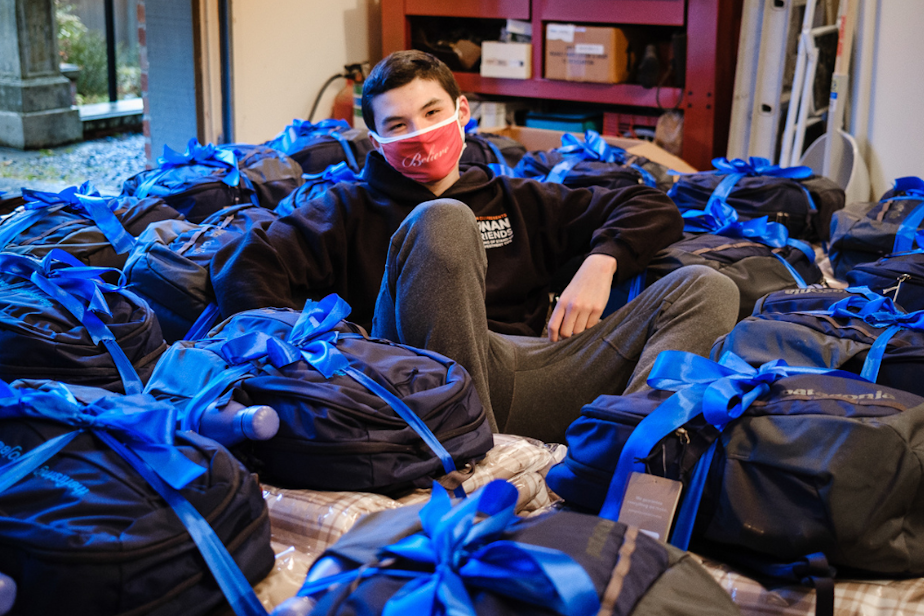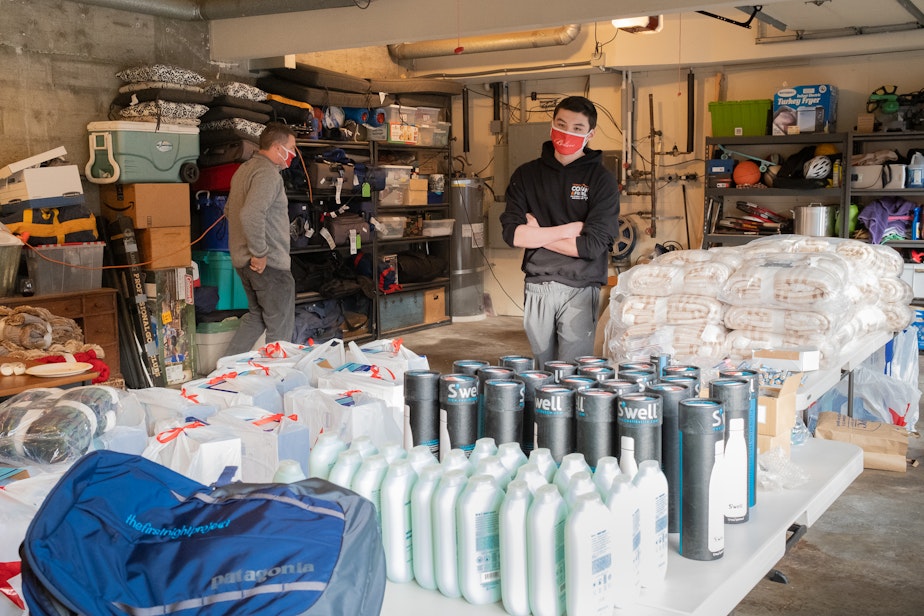The First Night Project makes cancer ward stays a little easier for teens

A cancer diagnosis "sucks." And the hospital stays that follow don't make it any easier. Seventeen-year-old Harry McGovern is trying to change that.
RadioActive’s Sidh Shroff has this story about his friend.
[RadioActive Youth Media is KUOW’s radio journalism and audio storytelling program for young people. This story was entirely youth-produced, from the writing to the audio editing.]
H
arry McGovern is a senior at Mercer Island High School. He's an avid writer, and lately, he spends a lot of time stressing about college applications.
Harry is also a teen cancer survivor. He vividly remembers his first night in the hospital — getting dropped off in a small room, being told that chemo starts tomorrow, and resting his head on a plastic headboard.
Sponsored
And Harry is not alone.
"There has never been a day where the waiting room is empty in the cancer ward, and there's never been a moment where all the rooms are vacant," Harry said. "This is widespread, and this is an enduring part of life that, for the time being, there's no magical pill for."
Harry said he struggled with the isolation of the cancer ward. And, he said, it's no five-star hotel.
"It sucks to be on cancer, but it might suck equally as much to be in a hospital room," Harry said. "The bedding, the pillows, the smell of the Gerber body wash that they give you every morning."
Many people in a hospital help make patients feel comfortable. In some hospitals that includes a child-life specialist. Child-life specialists care for the social and emotional needs of children and teenagers in the hospital.
Sponsored
Riley Coyle was Harry’s first child-life specialist at Seattle Children’s Hospital. Coyle said even though Seattle Children’s has more resources than other hospitals in the area, child-life specialists there still can’t tend to all the needs they want to.
"We are not making revenue for the hospital," Coyle said. "And more than likely, we're gonna be understaffed and asked to work really hard. And that's not uncommon within what we do — or within psychosocial services — within a hospital anywhere."
Child-life specialists are limited by funding and staffing, so it is difficult for them to spend quality time helping patients adjust to an unfamiliar environment.
In the meantime, Harry realized, the little things he didn't have in his hospital room — like fluffy pillows and soft blankets — could make a huge difference for cancer patients like him.
So Harry did what he could: he started making care packages.
Sponsored

The Make-A-Wish Foundation grants wishes for children with critical illnesses. Harry was granted one of these wishes, and he used his wish to start a nonprofit: The First Night Project.
Harry wanted to help other teens feel comfortable by providing care packages with the amenities he wished he had on his first night in the hospital. He started with putting 25 packages together in a garage.
"We just spent hours and hours in that garage, laughing, putting together what we could," Harry said. "That was sort of the moment I felt my wish had been fulfilled."
Isabelle Thompson was one of the first 25 people to receive a care package from The First Night Project.
Sponsored
"When I received that, it was really nice," Thompson said. "And it helped me a lot. I still have that pillow."

The care packages also impact child-life specialists like Riley Coyle.
"Harry's program is providing a resource that we can grab and go, and that's huge," Coyle said.
Since The First Night Project started 2020, Harry has sent care packages to more than 200 teenagers at six hospitals in the Pacific Northwest. And Coyle said the care packages are filling a need that hospital staff just can't meet.
Sponsored
"It would be lovely if we, as child-life specialists, could go in and assess needs, and likes and dislikes, and be able to make the space comfortable and feel even a little bit homey," Coyle said, "but we just do not have the capacity to do that in addition to the higher-priority interventions like diagnoses education and painful procedure support."
This isn’t just Seattle Children’s Hospital problem. Hospital budgets across the country don’t highly prioritize the social and emotional needs of teens. It's a complex, systemic problem creeping through childhood cancer wards all across the health care system.
"The responsibility of a children's hospital is your health, not your comfort," Harry said. "And frankly, I wouldn't want [comfort items] coming out of a hospital's budget if it meant cutting costs on research. So the value of The First Night Project is occupying a role that could be filled but isn't, and providing an aspect of care that, while not the first priority, is a priority in itself."
Harry saw a problem during his treatment, and now, through The First Night Project, he's helping teens have easier experiences in the cancer ward. And he's also brought more attention to the issue of teens’ emotional wellbeing in the hospital.
"Everyone has a part to play" Harry said, "in this big, synchronized waltz of health care."
This story was produced in a RadioActive Youth Media introductory workshop for high school-age youth. Production assistance by Frankie St. Pierre Nelson. Story edited by Kamna Shastri. Consultation support from Thomas Lu. Prepared for the web by Kelsey Kupferer and Kyle Norris.
Find RadioActive on Instagram, TikTok, YouTube and Facebook, and on the "RadioActive" podcast.
Support for KUOW's RadioActive comes from the Bill & Melinda Gates Foundation Discovery Center and BECU.



